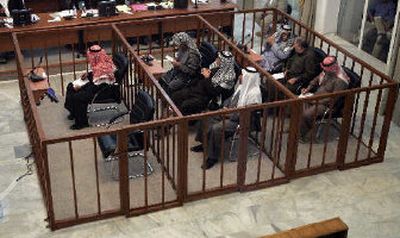Saddam absent as trial continues

BAGHDAD, Iraq – Saddam Hussein’s high-backed black chair was empty in the dock where his co-defendants sat Wednesday for the third day of testimony in their trial.
Two witnesses testified, telling more stories of terrible torture but still producing no evidence directly linking Saddam and his seven co-defendants to the bloody massacre of nearly 150 people in the city of Dujail in 1982.
The court adjourned on Wednesday until Dec. 21 to clear the calendar for a national election Dec. 15.
Saddam Hussein was excused from the roughly three-hour session, said Raed Juhi, the investigative judge who prepared the case against the deposed dictator and his co-defendants.
Before the session, Saddam, in his gray suit jacket and white button-up shirt, sat in his chair for one minute before asking the judge to excuse him in a three-minute speech. He gave no reason.
The deal was brokered to allow him to make the request before his afternoon plea, chief prosecutor Jafar Moussawi said.
“He made this request in the presence of his attorney. This is one of his rights, so it was accepted,” Moussawi said.
On Tuesday, Saddam had called the court unjust and told the judge to “go to hell” when he refused to delay the proceedings.
In Saddam’s hometown of Tikrit, more than 100 teachers, middle-school and primary-school students demonstrated in the streets to support him.
“With blood, with soul, we’ll sacrifice for you Saddam,” they chanted.
At the trial on Wednesday, the defendants looked haggard and the judge was visibly tired. He was quick to redirect the two witnesses when they strayed from the topic of Dujail and to silence defendant outbursts.
The two witnesses described torture, murder, starvation and sleep deprivation after they were taken from Dujail and moved to the capital, then to Abu Ghraib prison before ending up under guard in the desert near Samawah.
Juhi also said they were close to referring the Anfal case, a 20-year campaign of displacing Kurds. He said it would likely be next. In 1988, chemical weapons were used in the Kurdish town of Halabja, killing about 5,000 people.
The first witness said he was arrested in Dujail and taken to Baghdad. He was interrogated in what he described as a red room with bright lights. He was then moved to Abu Ghraib prison, where he was deprived of sleep and beaten at the mere mention of a toothache.
Eventually he was sent to the desert, where he and others lived in a tent with a television. They gathered wood, drank red dirty water from a well and suffered beatings.
One witness referred to defendant Barazan al-Tikriti in his testimony.
“When my turn came, the investigator asked me my name and he turned to Barazan and asked him, ‘What shall we do with him?’ Barazan replied: ‘Take him. He might be useful.’ We were almost dead because of the beatings.”
The witness said that someone standing next to him in Dujail told him that this was Barazan al-Tikriti.
After the judge interrogated one witness, Taha Yassin Ramadan, the former vice president of Iraq, told the court the charges against him were unfounded.
“As of yesterday, all the witnesses didn’t mention my name. Do they have any witnesses?” he said. “Witnesses that saw me? I can prove I did not attend all the places.”
Then al-Tikriti leapt out of his chair and pointed at the judge.
“I went to Dujail because I was the head of intelligence at that time,” he said. “I was responsible for security of the president, so it was my duty to go there and see what was happening.”